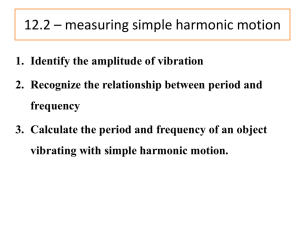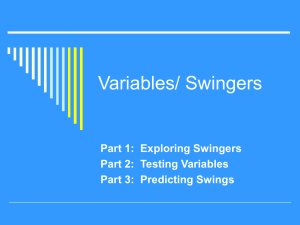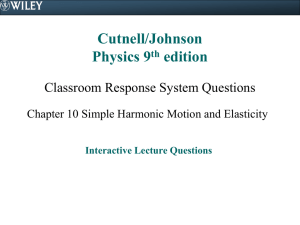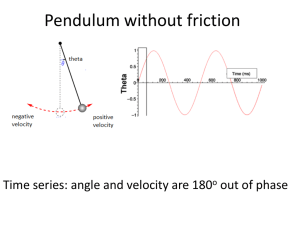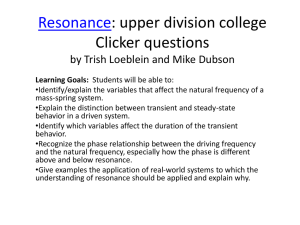Harmonic Motion
advertisement
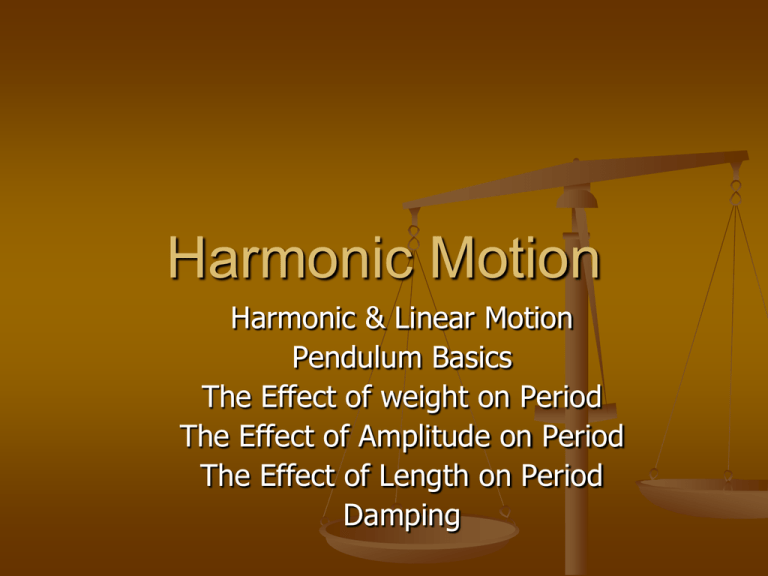
Harmonic Motion Harmonic & Linear Motion Pendulum Basics The Effect of weight on Period The Effect of Amplitude on Period The Effect of Length on Period Damping Harmonic & Linear Motion Harmonic motion Any motion that repeats over and over again Examples: Swing, car tire after hitting a bump, clock hands, heartbeat, planets orbiting, etc. Color and Music are both created by harmonic motion Occurs whenever the is a restoring force Restoring force is the force that makes the object return to its starting point In the pendulum, the restoring force is the part of the weight that is not supported by the string Linear Motion Motion that goes from one place to another Pendulum Basics The length of the pendulum is measured from the pivot point to the middle of bob The amplitude is how far the pendulum is pulled from its resting point Amplitude can be measured in centimeters or degrees The Effect of Weight on the Period of a Pendulum Weight does not affect the period of a pendulum Force Explanation Since gravity accelerates all objects at the same rate, the pendulum accelerates the same no matter how heavy it is. Heavy pendulums have more inertia (are harder to move), but gravity pulls harder on heavier objects. The larger force of gravity is canceled by the object’s inertia, so the pendulum travels at the same rate Energy Explanation We know that the speed of a falling object is given by v=√2gh. Mass doesn’t matter Comprehension Check If we took a pendulum to the moon, what would happen to its period and its amplitude? The smaller force of gravity would cause the pendulum to accelerate more slowly, increasing the period. The amplitude would remain the same as on Earth. What if we took the pendulum to Neptune, which is about 16 times bigger than Earth? The increase in gravity would make the pendulum accelerate 16 times faster, decreasing the period dramatically. The amplitude would remain the same as on Earth. The Effect of Amplitude on the Period of a Pendulum Amplitude does not affect the period Force Explanation A bob with a greater amplitude has a larger distance to travel, but it is going faster than a bob with small amplitude At a higher amplitude, less of the bob’s weight (force of gravity) is supported by the string so more force is available to accelerate the bob. Energy Explanation At a higher angle the bob has more potential energy to transfer into kinetic energy, meaning that it will be traveling faster when it reaches the bottom of the swing. Comprehension Check James made a pendulum by hanging a 1N and 3N weight from the same string. James measured 5 periods to be 7.5 seconds. He swung the pendulum again but this time the 1N weight fell off at the bottom of the second swing. How long did it take the pendulum to finish 5 period this time? The pendulum’s period would not be affected by the loss of the weight. Michelle swings a pendulum and measures the period to be 5.0s. She then leaves the room for a couple hours and returns to find the pendulum barely swinging. She again times the period. How should the new period compare to the old one? Since the amplitude does not affect the period, both periods should be exactly the same. The Effect of Pendulum Length on the Period As the length of a pendulum increases the period also increases Force Explanation The longer pendulum has a longer distance to travel, but doesn’t travel much faster. This results in a longer period. Energy Explanation The longer pendulum has to be lifted higher and has more potential energy to convert to kinetic energy The greater speed, however, is not enough to make up for the greater distance traveled. Comprehension Check Jill has a grandfather clock that keeps track of time by counting the swings of a pendulum. If her clock is running slow, what should she do to the pendulum to fix the problem? Jill needs to speed up the pendulum, which means she needs to make the pendulum shorter. Tracey, an eight year old girl is racing her bigger brother on a swing. Even though the swings are the same length, he always beats her no matter how hard she pumps her legs. Can you explain why the bigger brother always wins? Damping Damping – The gradual loss of energy and amplitude The friction results from wind resistance and the friction between the rope and stand Gravity keeps the pendulum going, its damping that makes it stop eventually The friction converts some the energy into heat Without friction, the pendulum would swing forever Damping only affects the amplitude Since amplitude does not affect the period, damping does not affect the period


